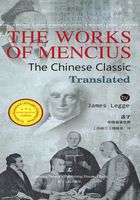
CHAPTER V
1. Mencius said to Ch'î Wâ, 'There seemed to be reason in your declining the governorship of Lingch'iû, and requesting to be appointed chief criminal judge, because the latter office would afford you the opportunity of speaking your views.


2. The first 牧 is the verb; the second a noun,=pasture-grounds. 诸=于, 其人,—'the man', i.e.their owner. 抑亦, —the force of the 亦 is—'or—here is another supposition—will be, &c.?' Mencius means that Chü-hsin should not held office in such circumstances.
4. 见 in 4th tone. 为都者,—为 has the sense of 'to administer', 'to govern'; compare Analects, IV. xiii.都,—properly 'a capital city', but also used more generally. In the dictionary we find:— (I) Where the sovereign has his palace is called 都. (2) The cities conferred on the sons and younger brothers of the princes were called 都; in fact, every city with an ancestral temple containing the tablets of former rulers. (3) The cities from which nobles and great officers derived their support were called 都. 为王, —为 in 4th tone.
CHAPTER 5. THE FREEDOM BELONGING TO MENCIUS IN RELATION TO THE MEASURES OF THE KING OF CH'Ȋ FROM HIS PECULIAR POSTTION, AS UNSALARIED.
1. Of Ch'î Wâ we only know what is stated here.Ling-ch'iû is supposed to have been a city on the borders of Ch'î, remote from the court, Ch'î Wâ having declined the governorship of it, that he might be near the king. 士师,—see Bk. I. Pt. II. vi. 2. 为其可以言,


Now several months have elapsed, and have you yet found nothing of which you might speak?'
2. On this, Ch'î Wâ remonstrated on some matter with the king, and, his counsel not being taken,resigned his office and went away.
3. The people of Ch'î said, 'In the course which he marked out for Ch'î Wâ he did well, but we do not know as to the course which he pursues for himself.'
4. His disciple Kung-tû told him these remarks.
5. Mencius said, 'I have heard that he who is in charge of an office, when he is prevented from fulfilling its duties, ought to take his departure, and that he on whom is the responsibility of giving his opinion, when he finds his words unattended to, ought to do the same. But I am in charge of no office; on me devolves no duty of speaking out my opinion:—may not I therefore act freely and without any constraint,either in going forward or in retiring?'